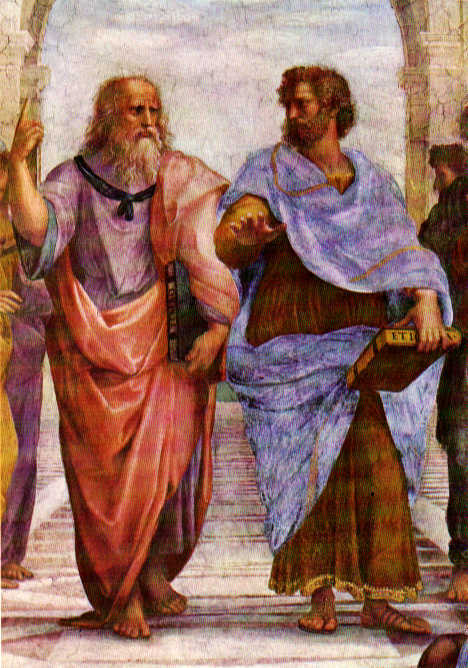Translations, from Portuguese, are automatic. If you notice any errors in the text, help us identify them, clicking here.
Subscribe to our Newsletters and receive our articles directly in your email.
Like all teaching, it is progressive. As humanity evolves its understanding changes. This article on Plato and Socrates is about that.
Remember the teachings of Last week's Sao Vicente de Paul? So, Saint Vincent de Paul spoke of the Gospel, that we should study it. Now, RE shows us something before Jesus, from the 5th and 4th century BC, from Plato and your mentor Socrates (remembering that it was Plato who wrote).

In the Spiritist Society, they had never imagined before:
“We will not discuss today this theory, which was so far from our thinking when the Spirits revealed it to us, which surprised us strangely, because - we humbly confess - what Plato had written on this special subject was then completely unknown to us, new evidence, among others. many others, that the communications given to us do not absolutely reflect our personal opinion. As for Plato's, we have only confirmed the main idea, and it is easily up to each one the form in which it is presented and to judge the points of contact that, in certain details, it may have with our current theory.
Kardec, Allan. Spiritist Magazine: first year: September/1858
The teachings of Socrates and Plato really carry the precepts of Jesus and are similar to those of the communicating spirits of Kardec's century.
In this article, RE presents as main ideas coming from Plato: the immortality of the soul, the succession of existences, the choice of existences as a result of free will, in short, the happy and unhappy consequences. Of course, Socrates, described by Plato, used parables to explain, because that was how they understood the lessons at that time.
In his allegory of the Spindle of Necessity, Plato imagines a dialogue between Socrates and Glaucon, attributing to the former the speech of the RE, about the revelations of the Armenian Er, a fictional character, in all probability, although some take him for Zoroaster. worth reading.
Kardec presents the essence of an allegory by Plato, where a man would have had an NDE and came back telling “the other side”. It is very figurative, and it shows the idea of the Trial Choices before we reincarnate.
In these teachings, when Plato quotes the Daughters of Necessity, he is talking about divine laws. See what he says:
Passenger souls, you will start a new career and be reborn (reincarnate) in the mortal condition. Genius will not be pointed out to you; you will choose it yourself. You will choose the one that luck calls first, and that choice will be irrevocable. Virtue belongs to no one: it allies itself to those who dignify it and abandons those who despise it. Each one is responsible for the choice he makes, God is innocent.'
Kardec, RE September/1858
Then he goes on to describe how the rebirth takes place, which is very similar to what the Spirits in Kardec's times explain.
Therefore, each one is responsible for the choice! God is innocent in his free will!
In OLE, these issues are addressed in depth, as in Part Two — On the Spiritist World or World of Spirits, Chapter VI — On the Spiritist Life, Choice of Evidence, as well as the questions 337 and 975.
This RE article is Kardec's seed for the elaboration of the Gospel According to Spiritism (April 1864). in your introduction exposes the relationship with the ideas of Christianity and soon after the morals of Socrates and Plato.
Note: we also indicate this great video about the Morals of Socrates and Plato of the channel Spiritism for All
Reading Recommendations (Books)
- Free PDFs by Kardec – https://bit.ly/3sXXBxk
- Autonomy – The Untold History of Spiritism: https://amzn.to/3PIvbyy
- Allan Kardec's Legacy: https://amzn.to/3RIn2gv
- Final point – the reunion with spiritualism with Allan Kardec: https://amzn.to/48PLaE7
- Neither Heaven nor Hell – The Laws of the Soul According to Spiritism: https://amzn.to/3F2voYO
- Genesis – Miracles and Predictions According to Spiritism (unadulterated): Free PDF or https://amzn.to/3RM91hF
- Heaven and Hell: Or divine justice according to Spiritism (unadulterated): Free PDF or https://amzn.to/3ZGrcal
- Spiritist Revolution. Allan Kardec's forgotten theory: https://amzn.to/3t7HIUH
- Mesmer. The denied science of animal magnetism: https://amzn.to/3PYc1X2
- The Book of Mediums: https://amzn.to/3PDNTHK
- The Spirits' Book: https://amzn.to/3QkcFx9
- Spiritist Magazine – complete collection: https://amzn.to/48Uxh7s
- Practical Instructions on Spiritist Manifestations: https://amzn.to/3QiR8Gc
- Spiritism in its Simplest Expression: https://amzn.to/3M6fXT5

